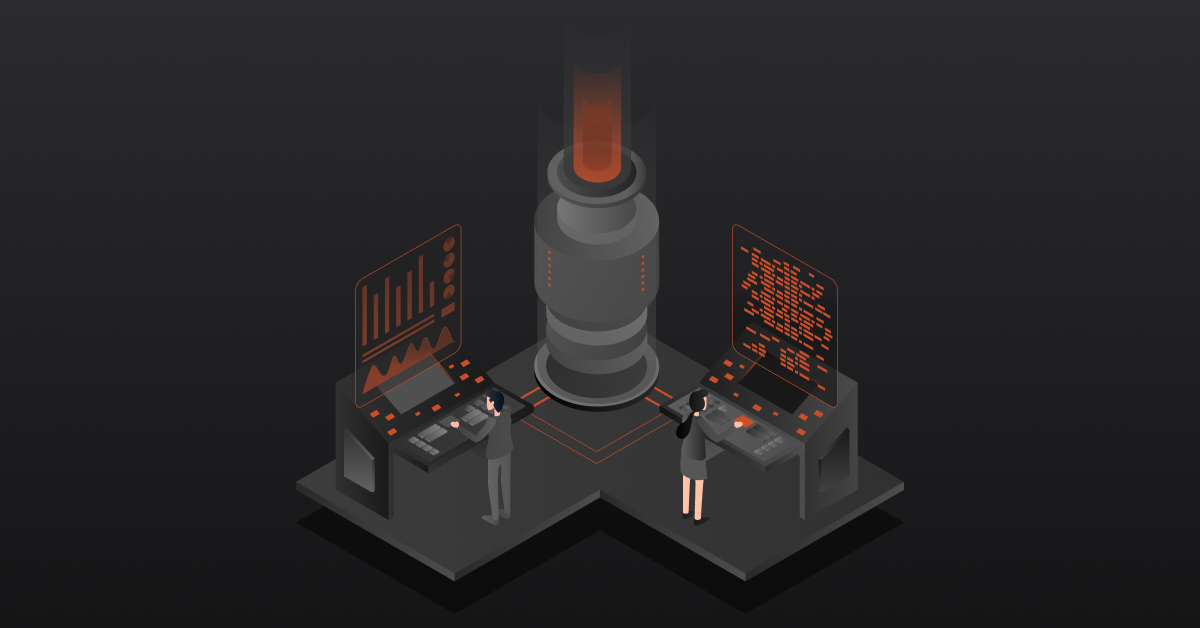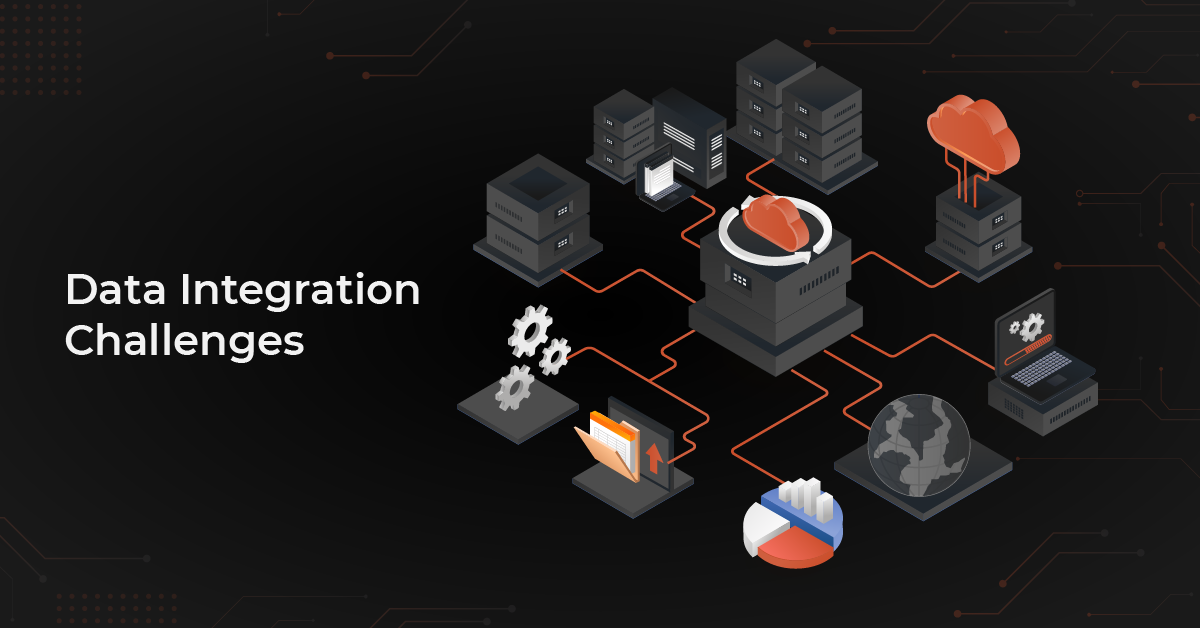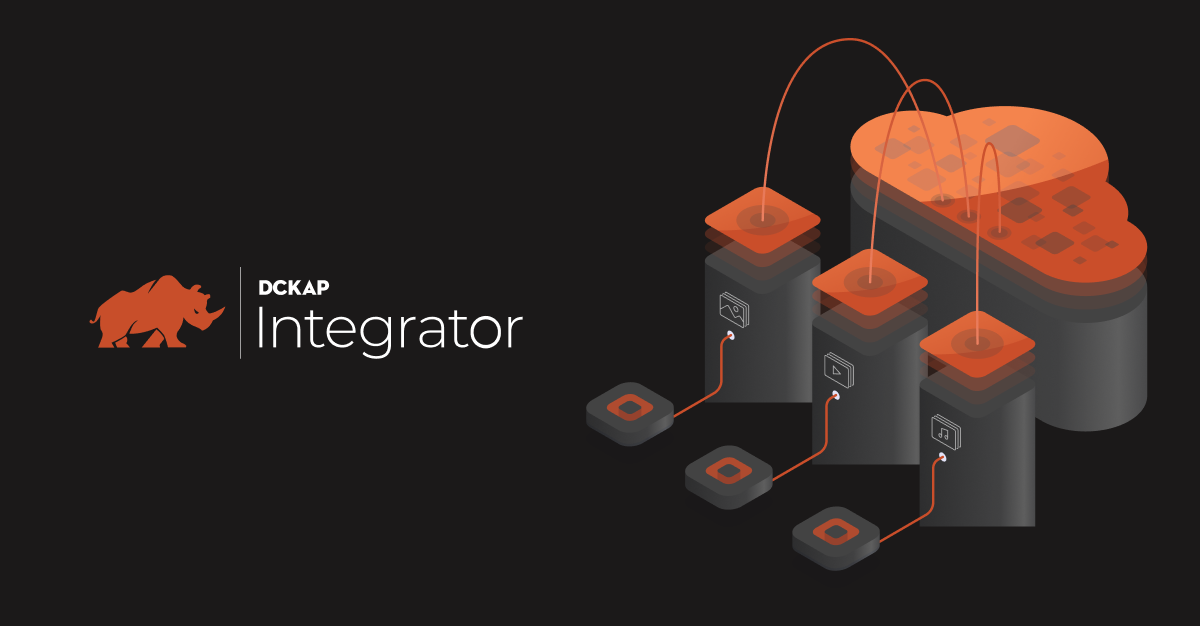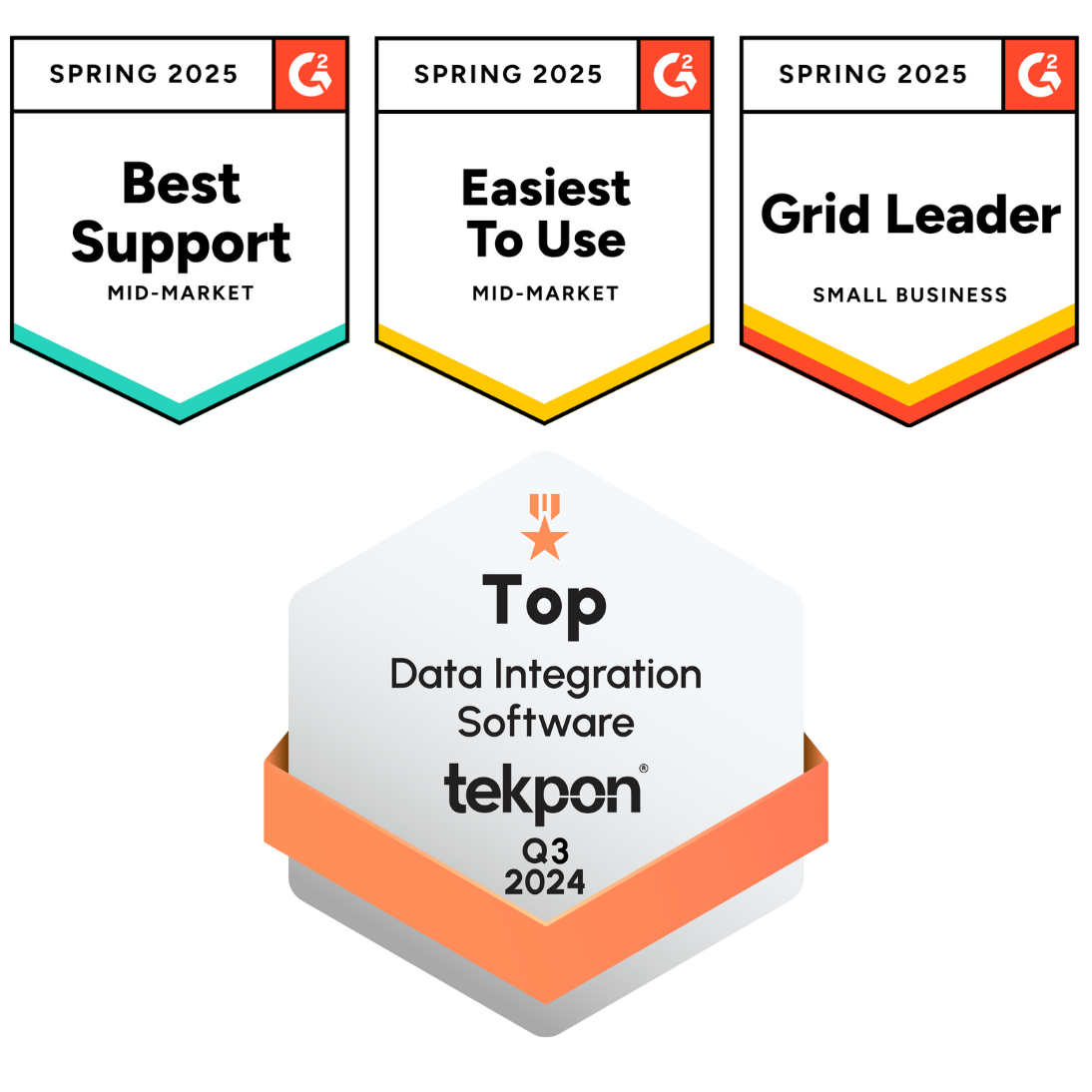Meeting customer demands and employee expectations requires that your business processes, whether large or small, be completely automated to achieve the desired responsiveness and agility. Undoubtedly, a modern, intelligent iPaaS (integration platform as a service) must deliver on all of these aspects. SnapLogic is a leading integration platform but distributors should explore other alternatives and competitors to find the right one for their business.
Here is a compiled list of some of the best data integration software that organizations can evaluate and consider.
- DCKAP Integrator
- MuleSoft AnyPoint
- Boomi
- Oracle Cloud Integration
- Qlik Talend
- IBM App Connect
1. DCKAP Integrator
DCKAP Integrator is a cloud-based enterprise ERP integration platform. It connects and enables real-time data synchronization between any number and type of business applications and data sources—ERP, CRM, e-commerce, databases, EDI (electronic data interchange), PIM (product information management, WMS (warehouse management system), and others such as Salesforce, Epicor Prophet 21, Oracle Netsuite, etc.
Offering scalability and simplicity to distributors in the automation process, DCKAP Integrator is an affordable yet powerful platform that enables development teams to run integrations effectively, eliminating downtime and costly manual errors.
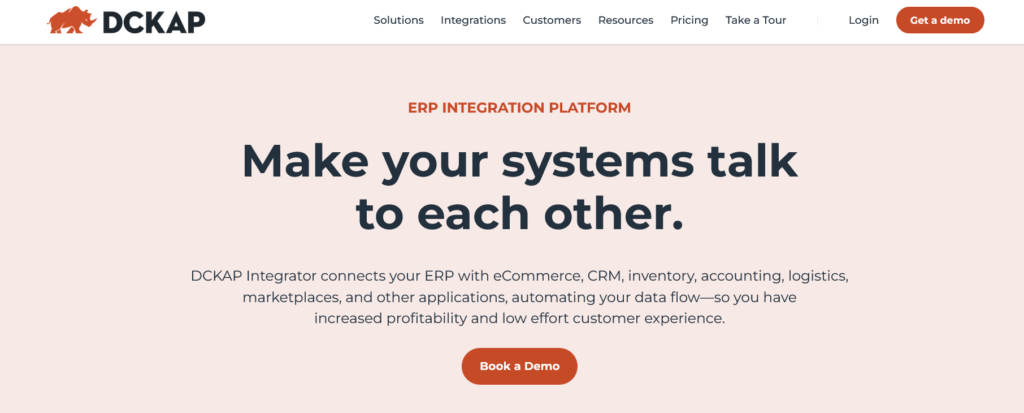
Key Features and Benefits
Here are some unique highlights of DCKAP Integrator that make it the preferred choice of distribution companies.
- Scalable architecture to meet your future needs
- No/low-code with ease of use
- Drag-and-drop feature for easy and quick project development
- Custom APIs for integrating multiple systems
- Versatile and user-friendly interface, requiring no specific coding knowledge to implement integrations
- Cloud-based technology eliminates the need to use different environments to deploy your technology
- Bidirectional data flows offer real-time insights for rapid decision-making and higher efficiency
- Eliminates data silos for a single source of truth
- Regular features upgrades and responsive customer support
- Stores data and files in AWS cloud and complies with SOC 1/ISAE 3402, SOC 2, SOC 3 FISMA, DIACAP, and FedRAMP, PCI DSS Level 1, ISO 9001, ISO 27001, ISO 27017, ISO 27018
Limitations
Reviewing error logs and flows can be difficult to grasp at initial use. The flow module is being redesigned for better readability and simplified integration.
Pricing
Three-tier pricing—Standard, Premium, and Enterprise based on features, support, integrations, and other features, starting at $999 per month.
2. MuleSoft Anypoint Platform
MuleSoft Anypoint Platform is an iPaaS solution that combines integration, automation of business processes, and API management. It relies on the API-led connectivity approach, integrating different systems, applications, data warehouses, etc., whether on-premise or in the cloud. It also provides a visual code-based guided experience to design, test, and document APIs.
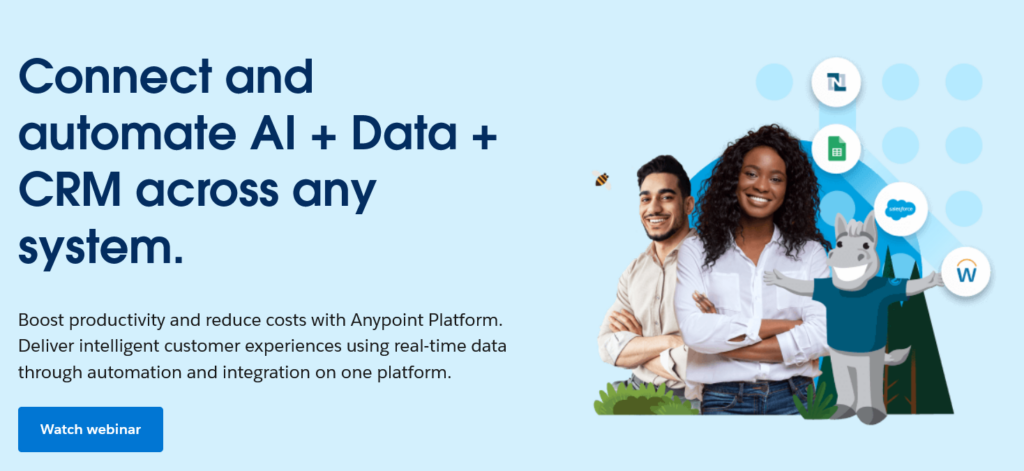
Key Features and Benefits
- Runs in different environments and architectures
- Allows business users to manage, scale, and secure APIs, along with monitoring and troubleshooting
- A library of pre-built APIs, connectors, templates, accelerators, and other integration assets that can be reused
- Ability to create custom integrations using MuleSoft SDK
- Data integration and transformation capabilities
- Enables the discovery of APIs built anywhere using CI/CD (continuous integration/ continuous delivery) pipelines
- Complies with ISO 27001, SOC 2, PCI DSS, HIPAA, GDPR, and others
Limitations
MuleSoft can be an expensive option, especially for small businesses. Plus, it has a steep learning curve which can be overwhelming for non-technical users.
Pricing
Pricing is based on API management and integration capabilities with other add-ons.
Related reads: Top 30 Data Integration Platforms
3. Boomi AtomSphere Platform
A global leader in integration cloud, Boomi offers a unified platform for B2B management, API design and management, workflow automation, data readiness, and app development. It helps customers deploy an integrated digital framework and connects data, devices, systems, and people across ecosystems.
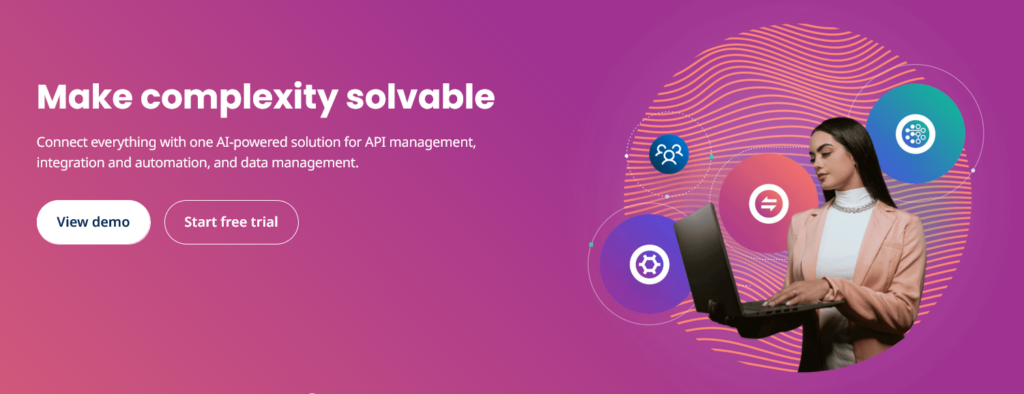
Key Features and Benefits
- Can be deployed in the cloud, on-premise, or hybrid environments
- Drag-and-drop visual user interface
- Supports key integration and communication patterns including ETL, batch, streaming, etc.
- Pre-built connectors, reusable components, and integration processes to accelerate integration
- Over 200 million crowdsourced integrations curated as suggestions
- Centralized monitoring to monitor the health and usage of APIs
- B2B/EDI management feature to integrate with vendors and suppliers
Limitations
Boomi Platform can be an expensive option for small companies. Plus, there can be challenges related to debugging and error handling.
Pricing
Different pricing models are available for SMBs ( small and medium-sized businesses) and enterprise-grade iPaaS—Professional, Pro Plus, Enterprise, and Enterprise Plus, with pricing starting at $99 per month.
Recommended Read: Top eCommerce Integration Solutions
4. OCI (Oracle Cloud Integration) Integration Services
OCI Integration Services include application integration, data integration, streaming, API full-cycle management, and process automation. It offers prebuilt connectivity to SaaS and on-premises applications, process automation templates, and a low-code visual builder for web and mobile application development. The Oracle Data Integrator allows data integration with an extract-transform-load (ETL) architecture.
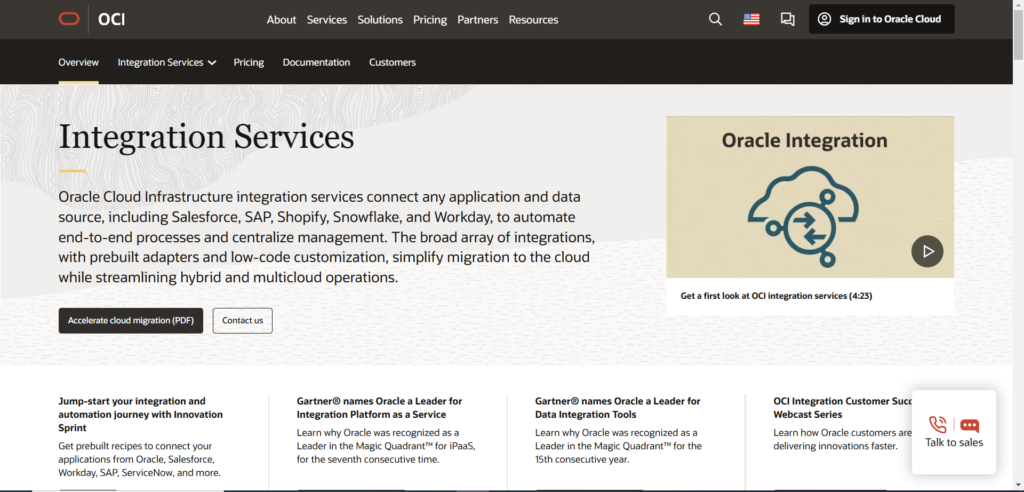
Key Features and Benefits
- End-to-end automation with centralized management
- Pre-built adapters, application integration, and low-code customization
- Real-time data integration, replication, and stream analytics
- Design, build, and secure internal or external APIs
- Recommendations based on machine learning for quick data mapping
- Reusable templates and dataflows
- B2B capabilities for EDI and safe file transfer
Limitations
OCI Integration Services has a steep learning curve for features and functionalities, and there may be limitations in terms of customization. Plus, the pricing may be high for some companies.
Pricing
It offers a comprehensive pricing plan for application integration and data integration services. Charges vary based on the messages per hour and OCPU per hour.
5. Qlik Talend
Qlik Talend is a unified platform for data integration, data quality, data integrity and governance, application and API integration, and API development. It supports the entire data life cycle and multiple deployment architectures. A low-code tool, Talend meets end-to-end data management needs across the organization.
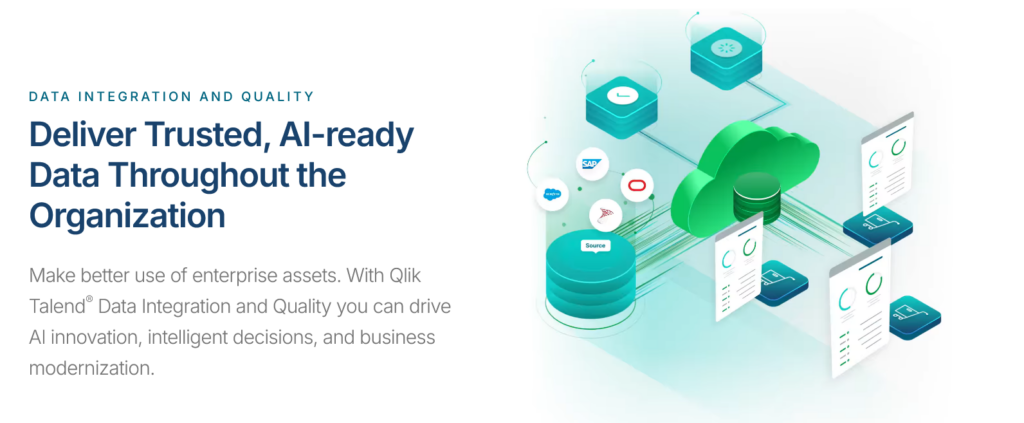
Key Features and Benefits
- Deploys in the cloud, on-premises, multi-cloud, or hybrid-cloud
- Cleans and profiles data in real-time
- Runs any integration pattern including pub/sub, point-to-point messaging, ESB, etc.
- Unifies data using effective tools for collecting, transforming, and mapping data
- Technology partnerships and integrations with providers including AWS, Microsoft Azure, Snowflake, and others
- Intuitive interface for visualizing and implementing mappings, routes, APIs, integration patterns, etc.
- Reusable assets including APIs and microservices
Limitations
Overhead costs can be high. The learning curve can be steep for new users. Also compare Talend vs Pentaho vs Informatica for next data integration
Pricing
Qlik offers Starter, Standard, Premium, and Enterprise options; quotes available on request.
6. IBM App Connect
IBM App Connect is a SaaS integration solution that connects data and applications seamlessly. Fully managed on AWS, it can be deployed on-premise, in the cloud, or aaS. It also offers intelligent mapping recommendations to transform complex data. Users can create custom connectors in the IBM Connect App using the Connector Development Kit (CDK).
Additionally, IBM API Connect allows business users to create, manage, secure, socialize, and monetize APIs across multiple environments throughout their entire lifecycle. It is also completely managed on AWS.
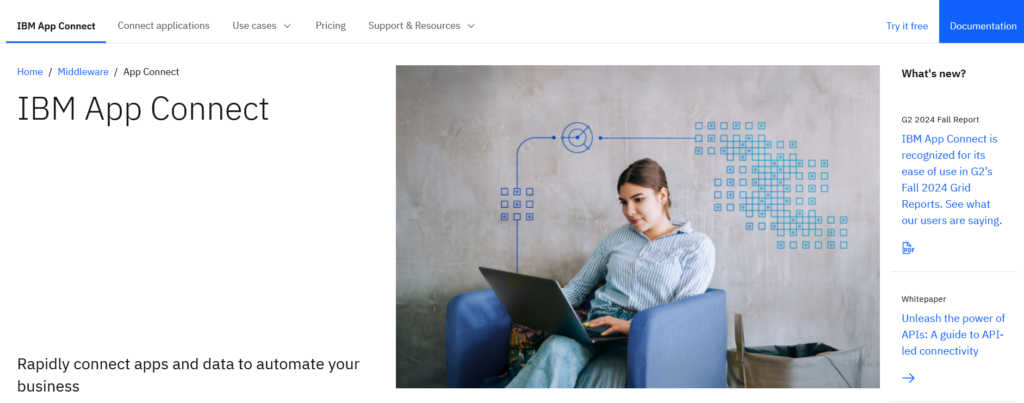
Key Features and Benefits
- No-code user interface (UI) and drag-and-drop workflows for non-technical users
- Hundreds of pre-built metadata-aware connectors and templates for popular apps
- AI-based features including AI-powered connectors and AI-powered mapping assistance
- Enables building automated CI/CD (continuous integration/ continuous delivery) pipelines along with dashboard views across different environments
- Offers developer toolkit with source and management tools such as GIT, Maven, Jenkins, etc.
- Centralized dashboard and management tools for complete visibility
Limitations
Its user interface can be complex for new and non-technical users with a steep learning curve. The pricing can be complex and on the higher side for some businesses.
Pricing
Options are available for iPaaS and Enterprise Integration Software (quotes on request).
SnapLogic Overview: From Features to Pricing
The SnapLogic Intelligent Integration Platform (IIP) is a unified platform for connecting data, apps, APIs (application programming interface), and IoT, whether on-premises, cloud, hybrid, or embedded. An intuitive, scalable, and cloud-built iPaaS, it automates application and data integrations and manages APIs, making it easier for business users to create scalable workflows and pipelines.
The IIP handles orchestrations, schedules, connections, and security with the help of the Designer, Manager, and the monitoring Dashboard.

Here’s a quick look at some of its core capabilities.
Data Integration and Automation
SnapLogic IIP enables you to consolidate data from multiple sources in different formats into a destination system, giving a unified view. Users can move data using streaming, even-driven, or batch velocities and also utilize ETL (extract, transform. load) and ELT (extract, load, transform) integration design patterns.
Application Integration
It allows businesses to transfer and map data between multiple applications by offering hundreds of pre-built out-of-the-box connectors (also called Snaps) and an easy-to-use environment. The low/ no-code integration platform effectively connects data stores, protocols, application endpoints, etc.
Pre-Built Connectors
Over 700 Snaps connect for some of the most commonly used ERP (enterprise resource planning), CRM (customer relationship management), Marketing, Service, Collaboration, Notification, Protocols, Standards, Databases, Data Warehouses, Big Data, IoT, Message Queues, etc. SnapLogic also provides JSDK, which is a library of Java APIs to assist developers with creating new, custom Snaps.
Iris AI
SnapLogic’s artificial intelligence-based integration assistant, Iris utilizes machine learning to predict and make suggestions on the steps in creating a data pipeline for analytics, cloud, and digital transformation initiatives with high accuracy.
API Development and Management
Users can manage, create, and secure APIs (application programming interface)—full lifecycle management using a single platform. Using SnapLogic’s API Management Portal, users can create applications and microservices using the chosen method of API development. Moreover, the API Developer Portal enables developers to publish, document, and remove APIs. Users can view performance analytics of APIs with respect to operations and business.
Security and Governance
SnapLogic is deployed in AWS (Amazon Web Services) and is certified by SOC 1 Type 2 (ISAE 3402 / SSAE18), SOC 2 Type 2, SOC 3, HIPAA-HITECH, ISO 9001, ISO 27001, ISO 27017, ISO 27018. It also complies with CCPA (California Consumer Privacy Act), GDPR (EU: General Data Privacy Regulation), General Privacy Standards, etc.
Pricing
SnapLogic uses the fixed-rate pricing model and is available on request.
Limitations
Although SnapLogic is a good data integration platform, it can take additional time and effort to learn to manage complex transformations and logic with multiple snaps for a simpler task. Additionally, the integration platform can be a costly option for many SMEs (small and medium-sized enterprises).
Especially, when it comes to the distribution industry, apart from core functionalities, the iPaaS solution must support industry-specific needs. This is where businesses need to look into SnapLogic alternatives and competitors to figure out what solution would work for them
Final Words
Gartner defines iPaaS as a vendor-managed cloud service that allows end-users to deploy integrations. For gaining actionable business intelligence, providing exceptional customer experience, and improving speed to market, cloud-based integration platforms are necessary. With different platforms competing for attention, it is important to choose the right one for your distribution business.
DCKAP Integrator is a low-code iPaaS solution that supports both large enterprises and fast-growing companies. To know more about how we can accelerate your business growth, get in touch with us today!


